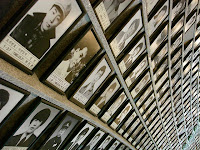
May is a month thick with meaning in South Korea. First comes the anniversary of the 5.16 Revolution which brought little known military figure Park Chung Hee to power, eventually turning him, slowly but inexorably and despite his many wrongs, into a national hero.
But, conversely, today is also the anniversary of the Gwangju uprising, one of those rare events which matched the narrative propagated by Pyongyang, thus inspiring ten days of blanket Chosun Central Television and radio coverage. It isn't necessary to retell once again the tragic story of the events which took place in Gwangju themselves, for they are well known. Troops were sent, the rebellion was crushed, and many people, just a few of whom can be seen on the right, were slaughtered.

It is to be hoped, though, that as time passes the way this event is remembered at the end of the No. 518 bus route in Gwangju comes to be better known. Here, in the countryside outside the city, and in a way that stands in monumental contrast to the glossing over of historical wrongs to be found at Seodaemun Prison in Seoul, lies the May 18 Memorial Cemetary, a construction which compares favorably with Auschwitz or the vast cemetaries on the fields of Flanders. Not in terms of horror, for this is nothing to do with historical relativism, but in terms of the sheer grace with which the burden of remembering the events of May, 1980 is borne.

There are no plastic replica soldiers shooting plastic replica Gwangju citizens, no mechanical replications of torture in action, and no avoiding of responsibility for what unfolded. There is no drama, and there is no hate. For this the people of Gwangju deserve a huge, huge measure of respect.



No comments:
Post a Comment